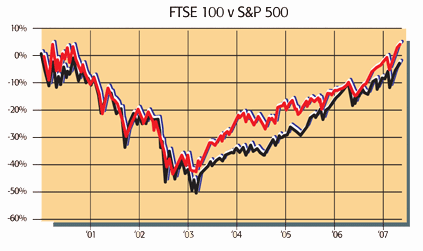
The bull just charges on. This week, America’s S&P 500 index regained its record peak of March 2000; and the Dow Jones index set another record. Britain’s FTSE 100 and European shares have hit six-and-a-half-year highs. All this despite Anthony Bolton, one of Britain’s leading fund managers, and Federal Reserve chief Ben Bernanke, sounding “‘alarm bells’” within days of each other, says Simon Watkins in the Daily Mail. This exuberance is beginning to look irrational.
Market fundamentals look weak
US stocks have become increasingly divorced from lousy fundamentals. It’s “amazing” that the market has risen this year despite falling earnings growth, says Jim Jubak on Moneycentral.msn.com. Profit growth of 8.2% in the first quarter of 2007 is a far cry from the double-digit rates of recent years.
And it’s only going to get worse. America’s housing market slide continues, with building permits down by an annual 21% in April to a ten-year low. With the “piggy bank” of home-equity loans fuelled by rising house prices getting closer to being “tapped out”, as John Mauldin on InvestorsInsight puts it, consumption is slowing. Chain store sales fell for the first time in four years in April and Wal-Mart reported its worst same-store sales drop since 1979. Paul Kasriel of Northern Trust expects first-quarter GDP growth to be revised down to 0.7%. “Call me old-fashioned”, but this is hardly a positive environment for stocks, says Mauldin. In the UK few observers have noted that, with interest rates at six-year highs clouding the economic outlook and the strong pound hampering multinationals’ competitiveness, “it does not do to be too complacent”, says
Chris Brown-Hume in the FT. Anthony Bolton is having trouble finding value in the market: “investors are not differentiating between higher and
lower-risk investments”.
Market underpinned by M&A frenzy
Chalk that up to the mergers and acquisitions (M&A) frenzy currently underpinning stocks. According to Justin Urquhart-Stewart of Seven Investment Management, M&A accounted for half of last year’s growth in the UK market. Last month was the busiest ever for global acquisitions; takeovers in 2007 amount so far to $2.2trn, almost 50% more than at this stage in 2000, the peak of the last M&A boom. With firms flush with cash and private-equity funds expected to raise about $250bn this year – almost four times the figure of five years ago – the market is behaving as if every firm is a takeover target.
There was an “extraordinary rumour” of a very unlikely tie-up between BP and Shell last week, says Watkins. There has hitherto been little sign of classic red flags, such as cross-sector deals and takeovers using inflated shares, as in 2000. But John Paul Rathbone notes on Breakingviews that last week’s mega-deals included an 85% premium paid by Microsoft and a 46% premium for Reuters; average premiums peaked at 39% in 2000. And the prices paid don’t justify the possible savings, so they seem likely to destroy value. This doesn’t mean the pace of M&A will end soon, but “it does suggest the boom has moved into bubble territory”.
Concern over lending standards
Both Bolton and Bernanke are worried about lending standards in private-equity deals. “Covenant-lite” deals, whereby the lender’s control and ability to monitor the investment are severely diluted, have become increasingly common; as Bolton says, “in many cases it appears to mean no covenant at all”. Banks are so desperate to partake of huge private-equity deals that they have become “hideously exposed to the risk of default”, says Julia Finch in The Guardian. All this underpins the “buoyancy” typical of the late stages of a bull market, says Bolton.
According to one senior banker, such bubble-like conditions in the credit markets are unprecedented, says Gillian Tett in the FT – except perhaps for the 1980s, “just before the collapse”. While the credit party seems likely to continue for a little longer, supporting equities in the process, investors should remember that the longer a party lasts, “the greater the risk of a future hangover”.